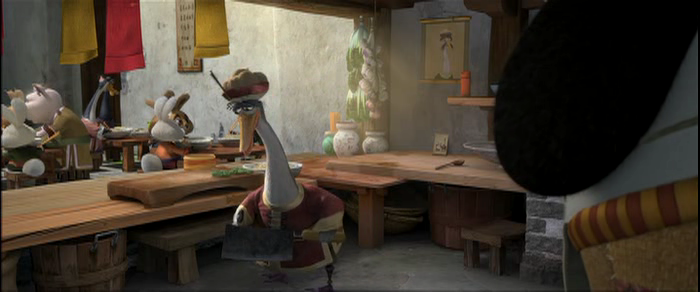Mr Ping in Kung Fu Panda
It turns out, after two thousand words, that I am still not done gushing over Kung Fu Panda, especially the character that first stoked my adoration of this movie. Mr Ping, the goose father of the titular panda Po, convinced me just five minutes into his movie that it would be far deeper and wiser than it looked. Take this following line of Mr Ping’s, uttered in response to Po’s query about why he never pursued a childhood dream of running away from his father’s noodle shop to set up his own tofu business:

Oh, because it was a stupid dream. Can you imagine me making tofu?
(Laughs) Tofu…
No. We all have our place in this world: mine is here…
Voice actor James Hong snippily rushes the first sentence, raises his already-high pitch to a strain on the next, forces his airy chuckles, lowers his voice to a nostalgic simmer on “Tofu…”, and then summarily exclaims “No,” thereafter reverting to Mr Ping’s regular speech patterns. It’s a canny piece of voicework. With this single line, the writers and actor sketch the submerged anguish that plagued the aging Sara Goldfarb (Ellen Burstyn) in Requiem for a Dream, recalling the rationalized happiness of the first part of her classic monologue, in which she anticipates her appearance on a TV show:
I’m somebody now, Harry. Everybody likes me. Soon, millions of people will see me and they’ll all like me. I’ll tell them about you, and your father, how good he was to us. Remember? It’s a reason to get up in the morning. It’s a reason to lose weight, to fit in the red dress. It’s a reason to smile. It makes tomorrow all right.
What have I got, Harry, hm? Why should I even make the bed, or wash the dishes? I do them, but why should I? I’m alone. Your father’s gone, you’re gone. I got no one to care for. What have I got, Harry? I’m lonely. I’m old.
The second part of this monologue captures how subtly cruel parents can be in guilt-tripping their children for pursuing their own lives, and the same idea is structured into Mr Ping’s next scene with Po. When Po headily tries to leave the restaurant to watch a historic kungfu tournament, Mr Ping stops him with a painfully innocent earnestness, interjecting Po’s attempts to explain where he’s going with wide-eyed, eager “Uh-huhs” that inadvertently bolster Po’s guilt at not wanting the future his father has planned for him. I’m reminded of Celine’s rant in Before Sunrise:
But you know what, if your parents never really fully contradict you about anything, and like are basically nice and supportive… It makes it even harder to officially complain. Y’know, even when they’re wrong, it’s this passive-aggressive shit, you know what I mean, it’s… I hate it, I really hate it.
Hong accomplishes his entire mission while skirting Burstyn’s pathos—perhaps because his character’s regret stems more from an unexplored avenue of passion, rather than a true purposelessness; and also because the genius of Kung Fu Panda is that it never lingers on these moments, so that they can be treasured by viewers old enough to understand the emotional truth behind them, while the younger members of the audience can breeze past them onto the movie’s next kinetic pleasure.
Kudos to Hong, too, for being one of the few voice actors in the movie—including Randall Duk Kim as the hoarse, crawling voice of Wugui the turtle; and Ian McShane with his haughty growl as Tai Lung the tiger—to appropriate the sound of his character’s animal, accenting his lines with a gooselike squawk. For a character actor like Hong, who has played bit Asian parts in classics including the manservant Kahn in Chinatown or the fur-wrapped engineer in Blade Runner, it might seem strange that his career-best work should arrive in an animated cartoon, in the shape of a Chinese goose. But, given the fullness he’s imbued this role, that’s nothing to be ashamed about.

